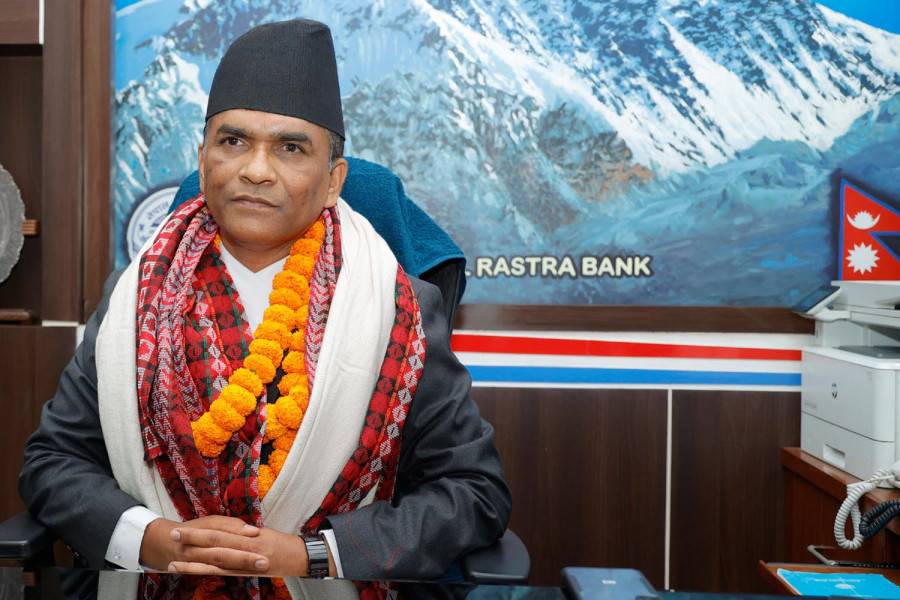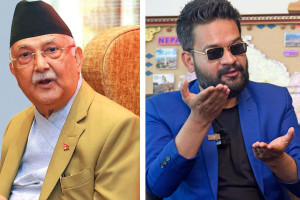Columns
Central bank at the centre of controversy
If Poudel wants to build a legacy for himself, he should fight for the bank’s autonomy.
Paban Raj Pandey
The appointment of Biswo Nath Poudel on May 21 as the 18th governor of the Nepal Rastra Bank has finally put to rest a two-and-a-half-month tug-of-war between the Nepali Congress and the Communist Party of Nepal (Unified Marxist-Leninist) to fill the post with their favoured candidate. Poudel’s predecessor, Maha Prasad Adhikari, completed his five-year stint on April 6. The Nepal Rastra Bank Act, 2002 requires the government to appoint a new governor a month before the term of the outgoing governor ends. But both the major ruling coalition partners wanted the coveted post for themselves, begetting dirty politics. In the end, the Nepali Congress won; however, deep down, more questions have been raised than answered.
It is possible that a bad precedent has been set. Section 21 of the Act states that no member or official of a political party will be eligible to become governor. Poudel was a card-carrying member of the Nepal Congress. In the November 2022 general elections, he ran from Chitwan-1 on a Nepali Congress ticket under a five-party coalition and lost, finishing third after the winner Hari Dhakal of the Rastriya Swatantra Party and former finance minister Surendra Pandey of the UML. Poudel says he no longer maintains party membership, nor has he sat on any Nepali Congress committee since taking up teaching at Kathmandu University School of Management two years ago. The issue could very well land in the court.
For now, Poudel deserves the benefit of the doubt. Party affiliation, in and of itself, should not be made an issue. In elections, be it central bankers, bureaucrats, judges, or what have you, they all exercise their rights as citizens. That said, Poudel may have cancelled his Nepali Congress membership, but, as an active member at one time, he is obviously close to the party, its agenda and ideals. Time will tell if he can put that aside and evolve as a central banker looking out for the good of the country. In the past, some of his predecessors have been accused of going overboard in helping the government of the party that appointed them and gumming up the works when the opposition was in power.
Politicisation of government appointments
As a newly minted governor, Poudel has a lot on his plate of potential worries. The weeks leading up to his appointment exposed the lengths to which parties go to divvy up the political appointment pie. As the two partners wrestled over who should lead the central bank, the deadlock resulted in five resignations, four of whom were governor hopefuls—Gyanendra Dhungana as CEO of Nabil Bank, Gunakar Bhatta and Prakash Shrestha as Nepal Rastra Bank executive directors, Poudel, and Bijaya Nath Bhattarai, a former governor, as members of a three-member governor recommendation committee. The latter blamed the committee’s failure to convene for a whole month as the reason for resigning.
In another twist in this political horse-trading, the resignations of Bhatta and Shrestha were never approved by Neelam Dhungana Timsina, acting governor, who, with the purported support of Prime Minister KP Oli for the top job, was one of the candidates herself. Hopefully, this rivalry between Timsina and Poudel does not linger to throw a monkey wrench into the day-to-day proceedings of the bank. It is no secret that a lot of intra- and inter-party wheeling and dealing goes on behind the scenes in political appointments. This time around, the country was treated to a front-row view into how these things get done. There is already a strong public perception that political appointees pay money to secure appointments.
The malpractice of filling important government posts along party lines, rather than solely on merit, likely does not comfort the Financial Action Task Force, a Paris-based anti-money laundering watchdog, which in February this year put Nepal on its grey list, with a risk of getting relegated to the dreaded black if no necessary reform is carried out within two years. Nepal already made the list in 2008 and remained there until 2014, when the Asset (Money) Laundering Prevention Act of 2008 was amended, giving regulatory authorities additional powers, among others. The problem is, they are hardly implemented—not a surprise outcome considering party loyalist appointees struggle to say ‘no’ to improper demands.
Right balance
One of the ways politicians try to undo legal reforms is through appointments that facilitate political interference. Laws can also be crafted in such a way that de jure independence does not translate into de facto independence. The Nepal Rastra Bank Act, 2002 ensures autonomy to the central bank but also leaves wiggle room for intervention. The bank’s board consists of the governor, two deputy governors, the finance secretary and three members appointed by the government, giving the executive branch a four to three majority should it seek to encroach. The finance minister also chairs a three-member recommendation committee to recommend three names for the governor’s appointment to the government.
Politicians—the majority anyway in Nepal’s context—are dictated by the next election cycle. They want funds to flow to their districts to woo the voters. They want their henchmen to prosper. And they always want good things to happen in the economy. But in any economy, a right balance is struck only when the fiscal policymakers know when to apply the brakes and when to accelerate. Else, too much of good news tends to result in excessive leverage, unbridled inflation and a loss of purchasing power. This is where monetary policy comes in. The job of an uncompromising central banker is not to toe the line of government but to use monetary policy as an antidote to reckless fiscal policy when the need arises.
Unfortunately, the Act was amended in 2016 to add that the government of Nepal may give directives to the bank as relates to currency, banking and finance, and that it will be the bank’s duty to abide by those. This ensures that the bank is at the beck and call of the executive branch. If Poudel wants to build a legacy for himself, he should fight for the bank’s autonomy and tell it like it is. Rather, in the post-appointment days, he, uncharacteristic to the job, has been actively talking to the media, saying his job is to assist the elected ones. While true, this statement should come with an asterisk, clarifying that there are times monetary and fiscal policies converge and there are times they diverge.




 10.12°C Kathmandu
10.12°C Kathmandu















